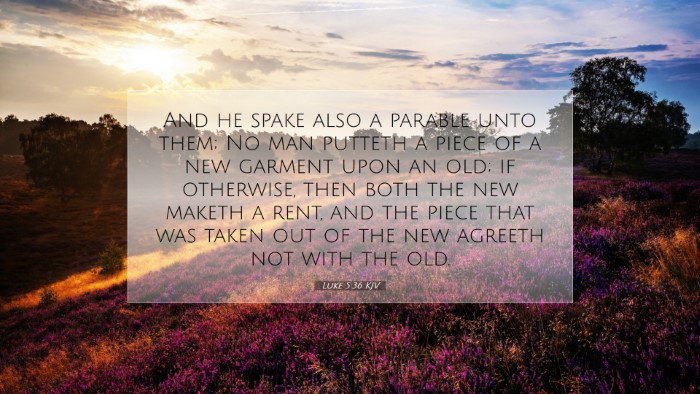Commentary on Luke 5:36
Luke 5:36 (KJV): "And he spake also a parable unto them; No man putteth a piece of a new garment upon an old; if otherwise, then both the new maketh a rent, and the piece that was taken out of the new agreeth not with the old."
Introduction
This verse presents a significant metaphor regarding the nature of spiritual renewal and the incompatibility between the new covenant of grace and the old covenant of law. In the context of Jesus’ ministry, this parable serves as a profound teaching to understanding the transformative nature of His message and the new way of living He introduces.
Contextual Analysis
Luke 5:36 appears in a narrative where Jesus is confronted by the Pharisees concerning His new teachings and practices, particularly regarding fasting and the observance of the Mosaic law. This parable addresses the tension between the old and the new, which is a recurring theme in the Gospel of Luke and throughout the New Testament.
Insights from Public Domain Commentaries
Matthew Henry's Commentary
Matthew Henry emphasizes that the parable illustrates the folly of trying to integrate the old system of law with the new grace found in Christ. He notes that a new piece of cloth sewn onto an old garment will not only fail to match but will also lead to further tearing. This highlights the incompatibility of the gospel with the traditional forms of Judaism that were prevalent at the time.
Henry further explains that the "new garment" symbolizes the teachings of Christ and the new covenant, which cannot simply be patched onto the old ways of the Pharisees. This parable implicitly critiques legalism and encourages believers to embrace the full extent of the new covenant, which offers redemption and joy that the old covenant could not provide.
Albert Barnes' Notes on the New Testament
In his commentary, Albert Barnes elaborates on the specific components of the parable. He notes that the term "new garment" signifies the new covenant established through Christ’s sacrifice, while the "old garment" represents the Hebrew legal system. Barnes asserts that Christ's ministry introduces a radical change that cannot be effectively merged with prior traditions.
Barnes also highlights that this teaching invites believers to experience spiritual renewal and transformation. The danger of mixing old and new teachings leads to confusion and ultimately renders the believer ineffective. Thus, Barnes encourages pastors and scholars to convey this message of divine renewal without the constraints of old traditions.
Adam Clarke's Commentary
Adam Clarke delivers a detailed analysis of the cultural implications of the parable. He explains that in the time of Christ, mending clothes was a common practice, and a newly woven cloth, when combined with an old garment, would shrink upon washing, causing further damage. Clarke utilizes this imagery to stress the inability of the Jewish law to fulfill the requirements of the new covenant.
Clarke's commentary urges theologians to recognize that the teachings of Jesus were groundbreaking. He posits that the call to Christ involves abandonment of former ways that do not align with the principles of grace. He emphasizes the necessity of a fresh experience in faith, anchored in the newness of life that Christ offers.
Theological Implications
The implications of this verse extend beyond its immediate context, commandingly shaping the understanding of Christian theology regarding salvation and ethics. The core message reflects a transition from law to grace, indicating that the transformative work of Christ introduces entirely new foundations for spiritual living.
It beckons believers to a complete reliance on the work of Christ rather than attempts to earn righteousness through works or adherence to old laws. This delineation is crucial for pastors as they shepherd their congregations, reminding them that the essence of the Christian life is rooted in faith and reliance on Jesus alone.
Practical Applications
- Embrace Newness: Encourage congregants to pursue a living relationship with Christ that embodies the themes of renewal and transformation.
- Cultivate Understanding: Provide teaching that clarifies the distinction between old covenant expectations and the new covenant of grace to prevent legalistic practices.
- Encourage Faith over Works: Remind believers that their standing before God is based on faith in Christ's work, not their own efforts to adhere to traditional laws.
- Promote Spiritual Growth: Stress the importance of continual growth and renewal in the believer’s life, helping them to engage practically with the implications of living under grace.
Conclusion
Luke 5:36 serves as a foundational verse in understanding Jesus' mission and the new covenant. The insights drawn from the commentaries provide a profound depth of meaning that underlines the incompatibility of old and new ways of living in light of Christ's transformative ministry. As pastors, students, theologians, and Bible scholars engage with this text, may they gain a clearer vision of the radical nature of Christ's message and its implications for life and ministry today.


